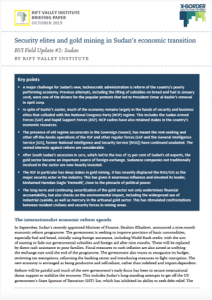Key Points
-
A major challenge for Sudan’s new, technocratic administration is reform of the country’s poorly performing economy. Previous attempts, including the lifting of subsidies on bread and fuel in January 2018, were one of the drivers for the popular protests that led to President Omar al-Bashir’s removal in April 2019.
-
In spite of Bashir’s ouster, much of the economy remains largely in the hands of security and business elites that colluded with the National Congress Party (NCP) regime. This includes the Sudan Armed Forces (SAF) and Rapid Support Forces (RSF). NCP cadres have also retained stakes in the country’s economic resources.
-
The presence of old regime securocrats in the Sovereign Council, has meant the rent-seeking and other off-the-books operations of the RSF and other regular forces (SAF and the General Intelligence Service [GIS], former National Intelligence and Security Service [NISS]) have continued unabated. The vested interests against reform are considerable.
-
After South Sudan’s secession in 2011, which led to the loss of 75 per cent of Sudan’s oil exports, the gold sector became an important source of foreign exchange. Sudanese companies not traditionally involved in the sector are now heavily invested.
-
The RSF in particular has deep stakes in gold mining. It has recently displaced the NISS/GIS as the major security actor in the industry. This has given it enormous influence and elevated its leader, Mohamed Hamdan Daglo ‘Hemedti’, close to the pinnacle of political power.
-
The long-term and continuing securitization of the gold sector not only undermines financial accountability, but also checks on the environmental impact, including the widespread use of industrial cyanide, as well as mercury in the artisanal gold sector. This has stimulated confrontations between resident civilians and security forces in mining areas.
This briefing is a product of the X-Border Local Research Network, a component of DFID’s Cross- Border Conflict—Evidence, Policy and Trends (XCEPT) programme, funded by UKaid from the UK government. The programme carries out research work to better understand the causes and impacts of conflict in border areas and their international dimensions. It supports more effective policymaking and development programming and builds the skills of local partners.




